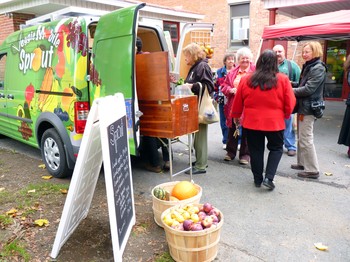Feasting from God’s Platter

Like its larger sibling, The Veggie Mobile, the Sprout is set up to accept electronic benefit cards, allowing food stamp recipients to easily use their benefits to shop for healthy produce. Photo by: CDCG
As Christians, we anticipate (despite everything!) heaven on earth, where even the most down-trodden are welcomed to God’s abundant feast. Valiant efforts are spreading across the nation to change the food system so all can access affordable and healthy food with dignity. The Capital District Community Garden (CDCG) illustrates what this looks like in the counties of Albany, Rensselaer, and Schenectady in New York.
The CDCG’s Veggie Mobile is a farmers market on wheels. One mother and her eight-month-old child frequented The Veggie Mobile and tried the recipes they shared. She fell in love with the salads. She loved the way The Veggie Mobile made salads with different textured greens and homemade dressings. She started shopping regularly at The Veggie Mobile because she liked the selection of greens. One day she wandered into the local corner store closer to her house, and noticed The Veggie Mobile logo on a refrigerator in the store. She now regularly buys from this convenient Healthy Convenience Store Initiative location but still stops by the Veggie Mobile from time to time to see what they are cooking up to keep broadening her horizons.
The Veggie Mobile and the new Veggie Mobile Sprout, allows CDCG to reach even more people, like the folks at the Lansingburgh Senior Apartments Low-income seniors and housing project residents look forward to the opportunity to shop for their favorite fruits and vegetables every week and interact with friendly staff.
In addition, CDCG’s 48 community gardens enable 4,000 low-income gardeners to enrich their diets with healthy foods, get physical exercise, and build community. One garden plot can provide up to $1,500 worth of organic produce in a growing season and helps promote self-sufficiency while alleviating hunger.
Urban poverty in the inner cities of the Capital Region, where poverty rates of 25-40% are not uncommon, has risen steadily since 2000. Rates in especially hard-hit neighborhoods approach 100% poverty, and hunger is the close companion of poverty. While community gardens alone cannot solve the problem of poverty, they can make a dent in hunger, while also building self-sufficiency and strength in communities.
Last year, CDCG opened two new community gardens – one at the Turf Mobile Home Park in southern Saratoga County and one in Steinmetz Park in Schenectady. The Turf Garden allows residents of this mobile home park – the largest in the county – to grow their own fresh vegetables and work together with their neighbors to extend God’s banquet table so all are included.
When individuals gain the power to feed their families by their own efforts, more than the body is nourished. A community gardener receives a large dose of self-confidence and self-esteem while simultaneously improving their nutritional well-being. This can be a real boost to individuals struggling with unemployment, poverty, disability, and substance abuse. The community gardens promote social interaction, healthful physical activity, improved nutrition and stress reduction – all essential to improving the quality of life.
![]() You may freely reuse and distribute this article in its entirety for non-commercial purposes in any medium. Please include author attribution, photography credits, and a link to the original article. This work is licensed under a Creative Commons Attribution-NonCommercial-NoDeratives 4.0 International License.
You may freely reuse and distribute this article in its entirety for non-commercial purposes in any medium. Please include author attribution, photography credits, and a link to the original article. This work is licensed under a Creative Commons Attribution-NonCommercial-NoDeratives 4.0 International License.